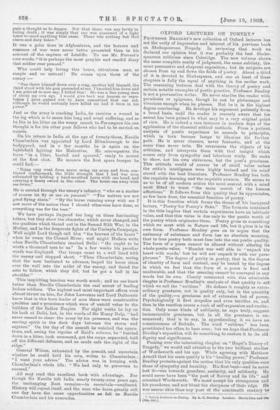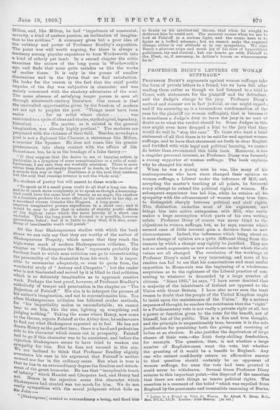OXFORD LECTURES ON POETRY.*
PROFESSOR BRADLEY'S new collection of Oxford lectures baa not the unity of impression and interest of his previous book on Shakespearean Tragedy. In reviewing that work we declared our opinion that it was probably the best Shake- spearean criticism since Coleridge. The new volume shows the same complete sanity of judgment, the same subtlety, the same persuasive and eloquent exposition; but its subjects are chosen from up and down the fields of poetry. About a third Of it is devoted to Shakespeare, and one at least of these chapters is fully the equal of anything in the earlier work. The remaining lectures deal with the theory of poetry and certain notable examples of poetic practice. Professor Bradley is not a provocative writer. He never startles the reader with paradoxes or epigrams, though he can be picturesque and vivacious enough when he pleases. But he is in the highest degree convincing. He develops his argument patiently from a broad basis, until the reader is scarcely aware that his assent has been gained to what may be a very original point of view. He is indeed a rare instance in modern days of the application of the classical critical methods. From a patient analysis of poetic experience he ascends to principles, which in turn become lamps to illumine his further path. He is never obscure, never fantastic, and at the same time never trite. He reverences the objects of his criticism, and interprets them with that insight which comes only from sympathy and laborious study. Ho seeks to show, not his own cleverness, but the poet's greatness. This attitude would of course be of small value unless the critic's intelligence were highly trained and his mind stored with the best literature. Professor Bradley has both the requisite learning and the requisite acumen. He seems to us to be of all modern critics the most central, with a mind most fitted to trace "the main march of the human affections." It follows from this quality that he appreciates, as few have done, the essential function of poetry.
It is this function which forms the theme of his inaugural lecture, " Poetry for Poetry's Sake." The formula contained in the title implies that certain experiences have an intrinsic value, and that this value is due only to the poetic worth of the poetry which originates them. Poetry gives us something which we meet with in Nature and life, but it gives it in its own form. Professor Bradley goes on to argue that the antinomy of substance and form has no absolute meaning, that in true poetry both must fuse into the one poetic quality. The form of a poem cannot be altered without altering its whole poetic value. "Hamlet was well able to ' unpack his heart with words,' but he will not unpack it with our para4 phrases." The degree of purity iu poetry, that is, the degree of identity of form and content, may be tested by the degree in which we feel that the form of a poem is final and unalterable, and that 'the meaning cannot- be conveyed in any words but its own. Closely connected with this admirable Chapter is Professor Bradley's analysis of that quality in art which we call the " sublime." He defines it roughly as extra- ordinary greatness, not in quality only, but in the quantity Of the quality,—a greatness not of extension but of power. Psychologically it first stupefies and even terrifies us, and then in the reaction comes a rush of self-expansion and exalta- tion. Only some kinds of sublimity, he says truly, suggest immeasurable greatness, but in all the greatness is un- measured; that is to say, in apprehending it we have no consciousness of finitude. The word " sublime " has been prostituted too often to base uses; but we hope that Professor Bradley's exposition will do something to restore it to its old dignity and significance.
Passing over the interesting chapter on "Hegel's Theory of Tragedy," we would call attention to the two brilliant studies of Wordsworth and his age. While agreeing with Matthew Arnold that his main quality is his "healing power," Professor Bradley protests against the notion that his only qualities were' those of sympathy and humility. His first bent—and be never lost it—was towards grandeur, austerity, and sublimity. He could never have 'been "the poet of Surrey and its life" and remained Wordsworth. We must accept his strangeness and his paradoxes, and not blunt the sharpness of their edge. He was nearer akin than any poet of the nineteenth century to " Oxford Lect arcs on Poetry. By A. O. Bradley. London: Macmillan and Ce. 0102. net.)
Milton, and, like Milton, he had "impatience of constraint, severity, a kind of austere passion, an inclination of imagina- tion to the sublime." A summary gives but a poor idea of the subtlety and power of Professor Bradley's exposition. The point was well worth arguing, for there is always a tendency among popular expositors to turn Wordsworth into a kind of elderly pet lamb. In a second chapter the critic examines the nature of the long poem in Wordsworth's age, and finds that none quite satisfies us like the works of earlier times. It is only in the poems of smaller dimensions and in the lyrics that we find satisfaction.
He looks for the reason in the fact that the chief poetic impulse of the day was subjective in character, and was mainly concerned with the shadowy adventures of the soul. The same absence of satisfying longer poems is seen all through nineteenth-century literature. One reason is that the unrivalled opportunities given by the freedom of modern art are apt to perplex the poet. "Things must have been
easier for an artist whose choice was restricted to a cycle of ideas and stories, mythological, legendary, historical His matter, as it existed in the general imagination, was already highly poetical." The moderns are Perplexed with the richness of their field. Besides, nowadays a poet is not a diplomat like Chaucer, a statesman like Milton, a courtier like Spenser. He does not come, like his greater Predecessors, into sharp contact with the affairs of life. Sometimes, too, he is in the bondage of a false theory :—
" If they suppose that the desire to see or imagine action, iu Particular, is a symptom of mere sensationalism or a relic of semi- 'barbarism, I am sure they are woefully mistaken. There is more virtue than their philosophy dreams of in deeds, in the motion of a muscle this way or that.' Doubtless it is the soul that matters, but the soul that remains interior is not the whole soul."
No student of poetry but will assent to these words
"To speak as if a small poem could do all that a long ous does, and do it much more completely, is to speak as though a humming- bird could have the same kind of beauty as an eagle, the rainbow in a fountain produce the same effect as the rainbow in the sky, or a moorland stream thunder like Niagara. A long poem requites imaginative powers superfluous in a short ono ; and it Would be easy to show that it admits of strictly poetic effects Of the highest value which the mere brevity of a short one excludes. That the long poem is doomed is a possible, however groundless, belief ; but it is futile to deny that, if it dies, some- thing of inestimable worth will perish."
Of the four Shakespearean studies with which the book
closes we can only say that they are worthy of the author of Shakespearean Tragedy ; which means that they reach the 1'43h-water mark of modern Shakespearean criticism. The ehapter on "Shakespeare the Man" represents probably the furthest limit to which mine criticism can go in reconstructing the personality of the dramatist from his work. It is impos- sible to summarise adequately, or even to quote from, the wonderful study of "Antony and Cleopatra "; but the reader who is not fascinated and moved by it is blind to that criticism which is so delicately imaginative as to approach creative work. Perhaps the best proof, however, of Professor Bradley's catholicity of temper and penetration is the chapter on " The .1iejection of Falstaff." His aim is to interpret the process of h le author's imagination, and not to conventionalise him. Too !ften Shakespearean criticism has followed cruder methods, for"his impartiality makes us uncomfortable ; we cannot
*ear to see him, like the sun, lighting up everything and
judging nothing." Taking the scene where Henry, now come the throne, rejects Falstaff at the Abbey door, he endeavours find out what Shakespeare expected us to feel. He has not drawn Henry as the perfect hero ; there is a hard and pedestrian Bide to hie Character which conies out in prosperity. Falstaff lad to go if this character was to be consistent, and before the il ejection Shakespeare seems to have tried to weaken our 1 Iva% for him. But he does not succeed in this aim.
overstates are inclined to think that Professor Bradley slightly
coward hie case in his argument that Falstaff is neither
that nor liar in the ordinary sense. Bat what is true is
__a .11e has an extraordinary degree the freedom and detach- 47feinnt_of the great humorist. He has that "inexplicable touch infinity" Which Hamlet and Cleopatra had, and Henry had Hence in the rejection scene this character which Shakespeare had created was too much for him. We do not really sympathise with the moral judgment which falls on . John e Es, a,
aespearej created so extraordinary a being, and fixed him
so firmly on his intellectual throne, that when ho sought to dethrone him he could not. The moment comes when we are to look at Falstaff in a serious light, and the comic hero is to figure as a baffled schemer ; but we cannot make the required change, either in our attitude or in our sympathies. We wish Henry a glorious reign and much joy of his crow of hypocritical politicians, lay and clerical ; but our hearts go with Falstaff to the Fleet, or, if necessary, to Arthur's bosom or wheresomover he is."











































 Previous page
Previous page